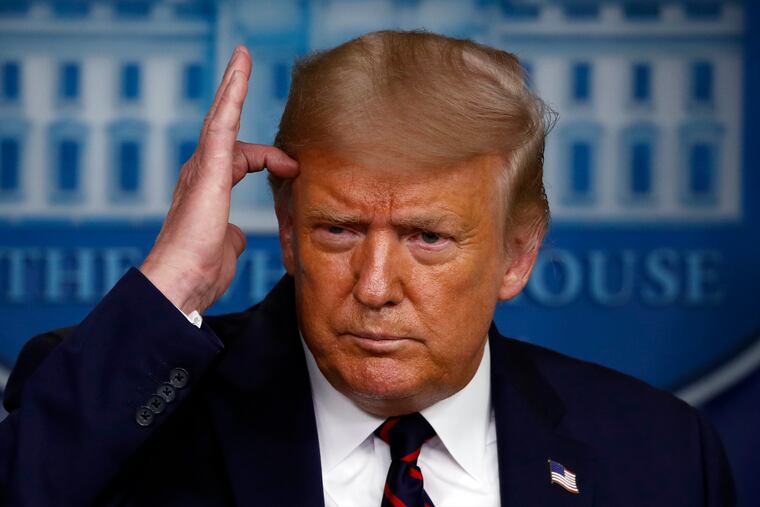With talk of postponing election, Trump seems more panicked than presidential | Opinion
City Journal staffer Steven Malanga on Trump's tweets and the legacy of Lincoln.

On Nov. 8, 1864, Abraham Lincoln defeated former Gen. George B. McClellan to win reelection as president of a divided United States. Barely 100 miles from Washington, D.C., Robert E. Lee’s Confederate army was encamped in a line that began at the capital of the Confederacy, Richmond, Va., and stretched to Petersburg, Va., as Lee faced off against the Northern forces of Ulysses S. Grant. Just a few months before the election, another Confederate army, led by Gen. Jubal Early, had threatened the capital, marching to within five miles of Washington before being driven back. Still, the election took place, and four months later, at his second inaugural, Lincoln declared, “With malice toward none; with charity for all; with firmness in the right, as God gives us to see the right, let us strive on to finish the work we are in.”
Last week, President Donald Trump suggested that a country facing a presidential vote during a viral epidemic should consider postponing its election amid fears of voter fraud. The unprecedented suggestion from a sitting president up for reelection that, for the first time in history, the United States delay a presidential election, was typical of the mystifying strategy — if that’s the right word — of Trump, an incumbent all too ready to accentuate the divisions, vulnerabilities, and uncertainties of our society. His proclamation sounded more panicked than presidential.
» READ MORE: Trump floats a nearly impossible Election Day ‘delay’ in another attack on mail-in voting
Some critics accused Trump of looking to distract attention from a sharp drop in the U.S. gross domestic product, announced shortly before Trump’s tweet. Though it’s sometimes hard to fathom the president’s motives (or those of his most persistent critics), the GDP decline was anticipated and not hard to explain; indeed, Germany just reported its largest drop in GDP in 50 years. But if Trump or anyone else thought floating an election delay was a shrewd distraction strategy, world financial markets certainly didn’t. They dropped precipitously July 30. As market analyst Jim Cramer said about Trump’s tweet: “It sows chaos, and chaos is bad for the stock market.” Chaos is generally not great for incumbents, either.
One needn’t dwell long on Trump’s tweet without remembering that the president doesn’t have the power to delay the election. Only Congress can do that, and the opposition party controls the House of Representatives, so even if congressional Republicans thought that a ballot postponement was a good idea — and key Republicans quickly said that they didn’t — there is little chance of it actually happening. One can’t be sure that our impulsive chief executive even bothered to check and see if that was the case before issuing his tweet, though his most passionate supporters suggest that he knew exactly what he was doing.
If Trump understood the example of Lincoln, he would see the problem of holding a presidential election in such a tumultuous year as a challenge to be overcome, a way to reaffirm the commitment to free choice in the world’s first modern democracy. Rather than sounding panicked, he would reach for inspiration. He might even call the election a “teachable moment” in which the United States demonstrated to the world that its democracy remains sound. Instead, his tweet only fostered more concerns about political stability in a year that has already generated enough worries on that score.
Trump’s tweet is even more frustrating considering that the U.S. election system contains genuine vulnerabilities. Legitimate concerns exist about local election officials threatening to eliminate in-person voting entirely, and the chaos that such steps could provoke in a tight race — as it has after some primaries. Rapid expansion of mail-in voting has increased the number of ballots invalidated by election officials, raising concerns that even legitimate votes will be thrown out. Techniques such as ballot harvesting, in which advocacy groups collect votes and file them en masse, suggest the possibility of new kinds of voter fraud in an age of increasing remote voting. The prospect of votes taking weeks to count, delaying a presidential result indefinitely, is troubling and could undermine the credibility of an election and stoke conspiracy theories — especially in the current climate. We know that such problems are real because they occurred in presidential primary races — Democrat against Democrat and Republican against Republican — belying the claims of some that voter fraud is a canard, and that systems put in place to discourage it are merely cooked up to suppress voting.
But it is Trump, of course, who has the bully pulpit and the machinery of federal investigation and enforcement at his command to call for change. It’s not a trivial or self-serving task to defend democracy — but it requires coherent expression. Trump should take inspiration from Lincoln, who told us that, “We the people are the rightful masters of both Congress and the courts, not to overthrow the Constitution but to overthrow the men who pervert the Constitution.”
We could use some of that kind of talk from the chief executive.
Steven Malanga is the senior editor of City Journal, the George M. Yeager fellow at the Manhattan Institute, and the author of “Shakedown: The Continuing Conspiracy Against the American Taxpayer.”